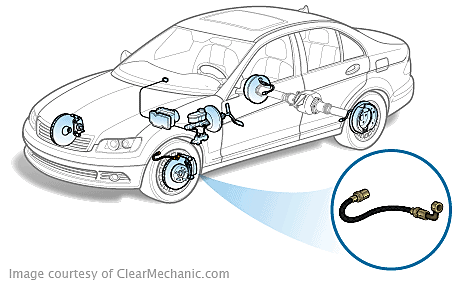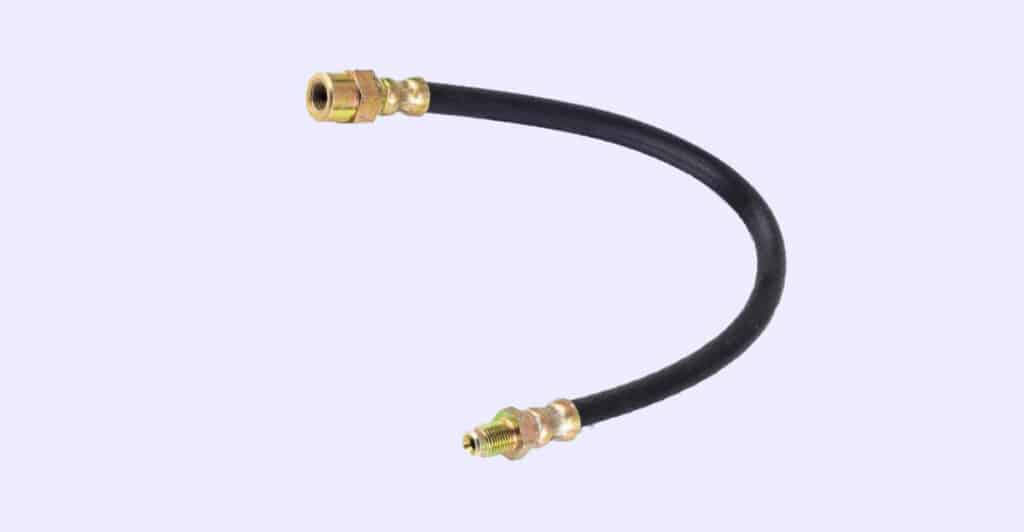Understanding the Importance of Brake Hoses
Brake hoses are a critical component in your vehicle’s braking system, connecting the brake calipers to the hydraulic system. They play an essential role in transmitting hydraulic pressure to your brakes, ensuring efficient stopping power. This article will discuss the importance of brake hoses, their types, and how to maintain them properly.
How the Braking System Works: The Key Players
Your car’s braking system comprises several key components, including the brake master cylinder, calipers, brake pads, rotors, and brake hoses. When you press the brake pedal, hydraulic fluid is forced through the brake hoses to the brake calipers, which then squeeze the brake pads against the rotors. This friction slows down the vehicle, allowing you to stop or slow down as needed.

The Function of Brake Hoses: Transmitting Hydraulic Pressure
Brake hoses serve as the conduit for transmitting hydraulic pressure from the master cylinder to the calipers. They must be flexible enough to handle the movement of the suspension and steering while maintaining their integrity under high pressure. Brake hoses play a crucial role in your vehicle’s braking performance and overall safety.
Types of Brake Hoses: Rubber vs. Stainless Steel
• Rubber Brake Hoses: Rubber brake hoses are the most common type found in vehicles, known for their flexibility and cost-effectiveness. However, they can wear out over time, becoming prone to cracks and leaks, which can compromise their performance.
• Stainless Steel Braided Brake Hoses: Stainless steel braided brake hoses are a more durable alternative to rubber hoses, offering improved resistance to wear and damage. These hoses are less prone to expansion under pressure, providing a more consistent brake pedal feel and enhanced braking performance.
Signs of Brake Hose Wear and Damage
• Cracks, Bulges, and Swelling: Inspect your brake hoses for visible signs of wear, such as cracks, bulges, or swelling. These can indicate that the hose is weakened and may fail under pressure.
• Brake Fluid Leaks: Brake fluid leaks near the calipers or brake hoses can signal a damaged hose that needs replacement.
• Poor Braking Performance: If you experience a soft or spongy brake pedal, it could be due to a damaged brake hose that isn’t transmitting hydraulic pressure efficiently.
The Dangers of Damaged or Worn Brake Hoses:
Damaged or worn brake hoses can have serious consequences on your vehicle’s braking performance. When brake hoses are compromised, they may not effectively transmit hydraulic pressure, leading to reduced braking efficiency. Additionally, damaged hoses can cause brake fluid leaks, which can deplete the fluid necessary for proper braking function. In the worst-case scenario, worn or damaged brake hoses can lead to total brake failure, making it impossible to stop your vehicle safely. This poses a significant risk not only to you and your passengers but also to other drivers and pedestrians sharing the road. It is crucial to address any issues with your brake hoses promptly to maintain a safe and reliable braking system.
When to Replace Brake Hoses: Mileage and Maintenance Recommendations
The ideal time to replace brake hoses can differ based on your specific vehicle and the conditions in which you drive. As a general rule, it’s crucial to follow your vehicle manufacturer’s recommendations for brake hose maintenance and replacement intervals. Regular inspections of your brake hoses should be conducted to identify any signs of wear, damage, or deterioration. Factors such as exposure to harsh weather conditions, frequent heavy braking, or driving in areas with poor road conditions may necessitate more frequent inspections and replacement. By adhering to your manufacturer’s guidelines and monitoring the condition of your brake hoses, you can help ensure the safety and optimal performance of your braking system.
Brake Hose Replacement: DIY or Professional Service?
Brake hose replacement may seem like a straightforward task for those with experience in car maintenance, but it requires precision and knowledge of the braking system. For this reason, many drivers opt for professional services to ensure their vehicle’s safety and proper brake function.
While some individuals may feel comfortable performing brake hose replacements themselves, it’s essential to weigh the risks and benefits. For most drivers, entrusting this task to a qualified mechanic can provide peace of mind and guarantee that the job is done correctly, ultimately ensuring a safe and reliable braking system.

Maintaining Your Brake Hoses: Tips for Prolonging Their Lifespan
Proper maintenance is key to extending the lifespan of your brake hoses and ensuring consistent, safe braking performance. Conduct regular inspections of your brake hoses for any signs of wear, cracks, bulges, or leaks. By catching any issues early, you can prevent more severe problems from developing. Additionally, maintaining clean brake fluid is essential, as contaminants can cause damage to both the brake hoses and other components of the braking system. Be sure to follow your vehicle manufacturer’s recommendations for brake fluid changes and use the appropriate fluid type. Addressing any issues with your brake hoses promptly will not only help prolong their lifespan but also contribute to the overall health and safety of your vehicle’s braking system.
Conclusion: Ensure Safe and Efficient Braking by Recognizing the Role of Brake Hoses
By understanding the vital role brake hoses play in your vehicle’s braking system, you can take steps to maintain them properly and address any issues before they become dangerous. Regular inspections and timely replacements can help ensure your brakes remain in top shape, providing a safer and more efficient driving experience.
